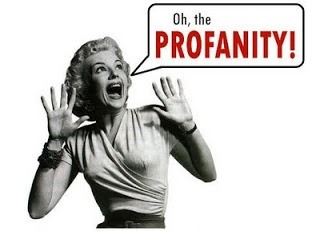by Gabrielle C. Durham
 A friend asked me to write a column about Russian cursing a few months ago. I do try to be accommodating, so I looked at several sites to get a better handle on it. In case you were not familiar, cursing in Russian is rich, much more calorically dense than most of what we have in English, except in the rarest cases of accomplished cussers. The problem for me is the translation; it would be so much more gratifying for you to read and imagine the vile torrents of insults than to read a lumpen approximation in English. Therefore, I decided to open up this column to the more universal topic of cursing.
A friend asked me to write a column about Russian cursing a few months ago. I do try to be accommodating, so I looked at several sites to get a better handle on it. In case you were not familiar, cursing in Russian is rich, much more calorically dense than most of what we have in English, except in the rarest cases of accomplished cussers. The problem for me is the translation; it would be so much more gratifying for you to read and imagine the vile torrents of insults than to read a lumpen approximation in English. Therefore, I decided to open up this column to the more universal topic of cursing.
What constitutes cursing? The intention I have in mind is not the imprecations hurled in movies at unsuspecting victims to drag down imminent posterity. No, I mean uttering profanities. Delicious four-letter words that got our knuckles rapped, our mouths washed out with soap, and led to smirking asides through our intentional and unintentional double entendres as teenagers. An excellent overview of dirty words, aka vulgarity, is the classic George Carlin bit on the seven dirty words.
It just feels so good to cuss. It gives you the illusion of control when you have none (e.g., sitting in rush hour traffic). Cursing can increase your feelings of aggression, of course, which does touch on a curious Russian attitude about swearing: The verb “to behave like a bull” (бычить) is used to describe the correct posture that big, scary guys who hurl curse words like tissues should have. Imagine hulking around, getting worked up and taurine to get in the proper frame of mind before tossing off some truly offensive invective. (This likely will not garner you a positive result, as you well know.)
Swearing permits us to express ourselves at a primal level. It’s a step above yowling. We can articulate anger, frustration, fury, joy, disbelief, and surprise when we use curse words. It’s innate; just watch a baby or toddler who is frustrated and without sufficient vocabulary who just screams. You know they would drop an F bomb in the blink of an eye. Most parents have cute stories about their precocious bundles of joy spewing some linguistic venom before they understand the meanings of the words.
Cussing lends greater emphasis to what you are saying, for damn sure. If you are given to hyperbole, you know what I mean. One swear word beats the pants off a series of adolescent exclamation points.
It has been proven that swearing relieves pain. If you effing say so . . . Uttering curse words while suffering physical discomfort ties in with increased heart rate, defensive expression, the curser’s brain’s emotional routing, and an effort to scare off a would-be attacker. It is funny to think that some blue language may serve as an effective mantra and throat clearer, at least according to the guru Osho (as previously mentioned in my column from October 2018).
Tossing off vulgarity acts as social lubrication for in-groups, building camaraderie among members. It bonds people when they agree on the overarching rules of usage or offends them if they disagree. Running your potty mouth (at any age) offers the glorious liberation of breaking taboos. You are shocking people deliberately when you cuss, and that’s part of the fun of letting it. Context matters. Using swear words in hate speech, abuse, and harassment is different from using the same words in self-deprecating jokes, slang, and sarcasm.
If you want to track other people’s cursing on Twitter, you can so easily do so using Cursebird, although it does not seem to have been updated in 7+ years. There is still so much we do not know about cursing and its “misperceptions.” There is an article on the difference between men’s and women’s cursing styles. Who wouldn’t want to be involved in those academic pursuits?
Then there are the “old-fashioned” curse words or minced oaths, which tended to have their genesis in religious contexts. These are along the lines of your great-aunt’s G-rated oaths of “My stars!” or “Dagnabbit!” They fit in nicely with today’s parents’ ersatz curses of “Fudge it!” and “Sugar” when indicating displeasure in the presence of the wee bairns. It’s challenging to think which I will use first: “Bejabbers!” “Dad-sizzle!” or “’Snails!” the next time an unintended inanimate object makes contact with some tender part of my body. I am also partial to the H. L. Mencken-era insults, admittedly tangential to the better-known curse words, such as “poltroons,” “mountebanks,” “scoundrels,” and “rascals,” which have the delightful side effect of being unknown to many listeners, so you are, again, getting away with saying something naughty.
May you curse mightily and fluently while behaving like a bull and cause only as much offense as you intend.
